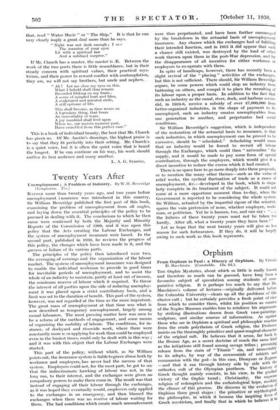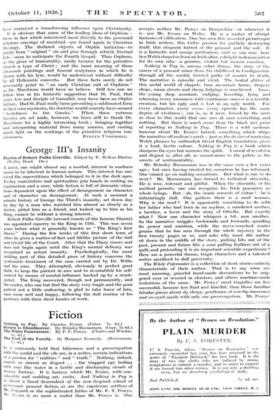Orphism
TI1E Orphic Mysteries, about which so little is really known and therefore so much can be guessed, 'have long been a favourite subject of speculation among students of conc parativc religion. It is .perhaps too much to say that Dr. Macchioro's volume of lectures—originally delivered before the Columbia University—clears up all the problems of this elusive cult ; but he certainly provides a fresh point of view from which to consider them, whilst his position as curator of the Naples Museum enables him to reinforce his argumentr by striking illustrations drawn from Greek vase-paintings, sculpture, and similar sources of information. As against those who see in Orphism a spiritual and philosophic reaction from the crude polytheism of Greek religion, the Professor insists on the thoroughly primitive and quasi-magical character of the original cult. He believes that it arose, far back in the Bronze Age, as a secret doctrine of much the same kind as the initiations still found among savage tribes ; promising release from the stain of " Titanic " sin, and immortality to its adepts, by way of the ceremonials of rebirth and communion with the god—in this case, Dionysus or Zagreas —.-and that it ran through history side by side with the orthodox cult of the Olympian pantheon. The history of Greek thought, mainly consists, in his view, in the gradual victory of the Orphic trend ; Christianity, the supreme religion of redemption and the eschatological hope, marking ' the climax of thus process diSeerts in the 'evolution dr Orphism three great stakes : the primitive or Mythological. the philosophic, in which it beeatne the inspiring force of Greek mysticism, and finally that in which he believes it to have exercised a transforming influence upon Christianity. It is obvious that some of the leading ideas of Orphism— those in fact which ministered most directly to the perennial religious cravings of mankind—are found again in Christian theology. The ' declared objects of Orphic initiation—to purify from " original " sin and give through rebirth Eternal Life—seem to anticipate the Fourth Gospel. Thus Orpheus, as the giver of immortality, easily became for the primitive church a type of Christ ; and the inner meaning of those catacomb paintings and funeral sculptures in which he is shown with his lyre; would be understood without difficulty by all Hellenistic converts. But these facts surely do not necessarily point to "an early Christian cult of Orphism" as Dr. Macchioro would have us believe. Still less can we follow him in his fantastic suggestion that St. Paul, that strict Jew and disciple of Gamaliel, may have been an Orphie initiate. Had St. Paul really been presenting a sublimated form of their own mysteries, his doctrine would scarcely have seemed foolishness to the Greeks." When these extreme theories are set aside, however, we have still to thank Dr. Macchioro for a highly interesting book ; bringing together and interpreting material from many sources, and casting mach light on the workings of the primitive religious con-









































 Previous page
Previous page